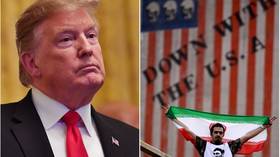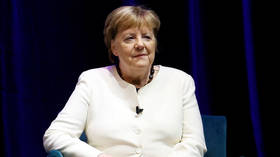‘Trump loves surprises, so we’ll entertain him’ – Iranian FM warns of retaliation over oil sanctions

Iran has something in store for Trump in case all countries bow to his pressure and stop buying its oil, Tehran’s top officials have said. They warned that there are many ways to retaliate in such a scenario.
The Islamic Republic has “other means” at its disposal besides the much-feared closure of the Strait of Hormuz, Foreign Minister Mohammad Javad Zarif told Switzerland’s Basler Zeitung. He evaded further questions, only saying: “Trump loves the element of surprise, so we’ll entertain him.”
Also on rt.com Iran has new ‘potential’ buyers for its oil, defying US sanctionsLast year, the Trump administration unleashed fresh sanctions on Iran, hitting its oil exports as well as its banking and shipping industries. Specifically, it hampered mutual trade between oil-rich Iran and European countries, including France, Germany and the UK. The EU states objected to the sanctions but stopped importing Iranian hydrocarbons, according to Zarif.
The Europeans must ask themselves: if they allow for this precedent, what would they do if the US demands to end trade with China?
Other high-ranking officials were more specific about retaliatory measures being put in place in the event of a worst-case scenario. “Apart from closing the Strait of Hormuz, we have other options to stop oil flow if threatened,” Ali Shamkhani, secretary of Iran’s Supreme National Security Council, told the semi-official Tasnim news agency.
Tehran has repeatedly threatened to cut off the strait, through which about 30 percent of all seaborne oil is transported each year. However, it has yet to follow through on these threats.
Without revealing full details, Shamkhani said that Iran “has plans in place that will neutralize the illegal US sanctions against Iran’s oil exports.” The current Washington administration lacks goodwill, and therefore engaging with it is useless, he stated.
Also on rt.com Switzerland & Iran developing payment channel to bypass US sanctionsThere is still a host of countries outside Europe that are continuing to buy Iranian oil. These include India, Turkey, South Korea and China. They were granted 180-day US waivers, though there is little hope that these will be extended after they expire in May.
In 2018, US President Donald Trump withdrew from the nuclear deal, formally known as the Joint Comprehensive Plan of Action (JCPOA), citing its supposed flaws. The historic document was signed in 2015 between Iran and the UK, the US, France, Germany, Russia, China, and the EU. All other parties condemned the US withdrawal.
Since then, Washington has steadily been re-imposing new restrictions, but the latest package seems to be the most significant. Aside from the oil trade, over 700 individuals, entities, vessels and aircraft have now been added to the sanctions list. The US says that more than 100 big international companies quit Iran because of the looming sanctions last year.
EU states are trying to preserve fragile trading ties with Tehran by working on a so-called Special Purpose Vehicle (SPV) to facilitate financial transactions between the bloc and Iran in order to bypass US sanctions.
Subscribe to RT newsletter to get stories the mainstream media won’t tell you.















